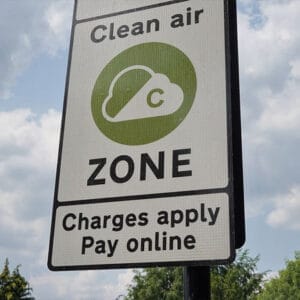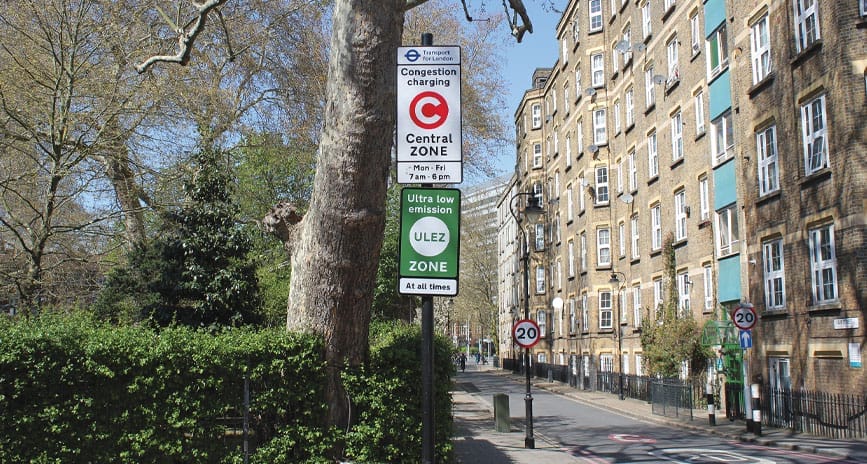CAZ, ULEZ, LEZ, ZEZ, CCZ, ZEV – what does it all mean?
Ultra Low Emissions Zone (ULEZ)
ULEZ are areas of cities identified as suffering from particularly high levels of pollution, specifically pollution caused by vehicles. So far, the ULEZ scheme has been rolled out in London, where it has recently been expanded from central areas to include all London boroughs.
Drivers of older and/or high-emission vehicles have to pay a charge of £12.50 a day when they drive within the ULEZ. Larger vehicles such as buses, coaches, and lorries can be charged £100 a day if they don’t meet the required standards. The regulations also apply to vehicles registered outside the UK travelling within the ULEZ.
 Clean Air Zone (CAZ)
Clean Air Zone (CAZ)
A CAZ is very similar to an ULEZ. You’ll find a CAZ in many cities across England and you’ll need to pay a charge if your vehicle doesn’t meet the required emissions standards. There are four types of clean air zone as defined by the UK government…
• Class A – Buses, coaches, taxis, private hire vehicles
• Class B – Buses, coaches, taxis, private hire vehicles, heavy goods vehicles
• Class C – Buses, coaches, taxis, private hire vehicles, heavy goods vehicles, vans, minibuses
• Class D – Buses, coaches, taxis, private hire vehicles, heavy goods vehicles, vans, minibuses, cars, the local authority has the option to include motorcycles
Clean Air Zones operate 24 Hours a day, every day of the year. Most vehicles are subject to the guidelines, however, there are exceptions, and the following vehicles are entitled to a national exemption:
• a vehicle that’s ultra low emission
• a disabled passenger tax class vehicle
• a disabled tax class vehicle
• a military vehicle
• a historic vehicle
• a vehicle retrofitted with technology accredited by the Clean Vehicle Retrofit Accreditation Scheme (CVRAS)
• certain types of agricultural vehicles
There is also a way to check your vehicle by entering your registration to see what daily charge would be incurred driving within a CAZ:
vehiclecheck.drive-clean-air-zone.service.gov.uk/vehicle_checkers/enter_details
Cities with Clean Air Zones
Bath – Class C
Covering most of Bath city centre, charges in this zone mainly apply to large and private hire vehicles (things like buses, coaches, HGVs, taxis, vans and minibuses). For the smaller vehicles in these categories, the charge is £9 per day, while buses and HGVs can be charged up to £100 if they don’t meet the emissions standards. Private cars and motorbikes don’t face any charges or penalties in Bath’s CAZ, regardless of the emissions they produce.
Birmingham – Class D
Birmingham’s Clean Air Zone was launched in June 2021 and covers the covers an area of the city centre within the A4540 Middleway. Regular high-emission vehicles, (like cars and taxis) are charged £8 a day to drive within the zone, while it’s £50 a day for bigger vehicles (like buses, coaches, and HGVs).
Bradford – Class C
Bradford’s Clean Air Zone was introduced in 2022. It covers the Bradford outer ring road, the area inside the ring road, and the Manningham Lane, Bradford Road and Canal Road areas (including Shipley and Saltaire). There’s no charge for privately owned vehicles, but all other non-compliant vehicles have to pay to enter. Charges are £50 for HGVs, coaches and buses. Minibuses and light goods vehicles are charged £9. Private hire vehicles pay £7.
Bristol – Class D
Bristol’s CAZ was launched in November 2022 with a small Class D CAZ. This means everyone pays to drive within the CAZ – regardless of their vehicle. The city hopes that the scheme will encourage drivers and businesses to make changes in their commutes or routes in order to keep the air clean.
Portsmouth – Class B
Portsmouth’s Clean Air Zone was introduced in November 2021, but doesn’t apply to private vehicles. Charges start at £10 per day for non-compliant private hire vehicles and go up to £50 for HGVs and buses. The zone is active across the city centre, surrounding Gunwharf Keys, the University, Cascades, and the M275.
Sheffield – Class C
Sheffield’s Clean Air Zone was launched in February 2023 and covers a large amount of the city centre, including Park Square and the A61/Parkway Junction. Daily charges for LGVs and taxis that don’t meet emission standards are £10, while there’s a £50 fee for buses, coaches, and HGVs. Private cars and motorbikes are not charged to drive within the CAZ.
Tyneside (Newcastle and Gateshead) – Class C
Newcastle’s CAZ came into effect from 30 January 2023. Larger vehicles that don’t meet the required standards are charged £50 per day, while vans and private hire cars are charged £12.50. The zone covers most of Newcastle’s city centre as well as routes over the Tyne, Swing, High Level and Redheugh Bridges. It currently only affects buses, coaches, taxis, vans and heavy goods vehicles that do not meet national Clean Air Zone emissions standards. Private cars don’t face any penalties.
Future clean air zones
Greater Manchester (under review)
Greater Manchester didn’t launch their CAZ in May 2022 as planned. Clean Air Greater Manchester explains: “The pandemic resulted in significant vehicle supply chain issues, rising vehicle prices, and a cost-of-living crisis. The original Clean Air Plan was no longer the right solution and could have caused significant financial hardship. We aim to clean up the air we all breathe through an investment-led Clean Air Plan that does not include a charging Clean Air Zone.” Consultations are currently underway.
Liverpool
Liverpool councillors rejected plans for a CAZ in August 2022, citing similar reasons for a levied charge to be introduced that Manchester did. There are currently a number of different actions and consultations planned to clean up the worst polluted areas of the city.
Low Emissions Zones (LEZ) in Scotland
Scottish Low Emission Zones are very similar to Clean Air Zones run in English cities. There are four currently in operation in Scotland’s cities:
Aberdeen
Plans for the Aberdeen LEZ were finalised in May 2022. The current proposal is to charge drivers of older petrol and diesel vehicles, HGVs, buses, and coaches. It’s expected to launch in 2024.
Dundee
The Dundee LEZ is set to be enforced on 30 May 2024. It’ll cover an area within the A991 Inner Ring Road, excluding the Bell Street, West Marketgait NCP and Wellgate car parks. Private hire vehicles, buses, coaches, and HGVs that don’t meet emissions standards will be affected.
Edinburgh
Discussions surrounding the Edinburgh LEZ were finalised in October 2021, and will be introduced in June 2024. The zone covers a large portion of the city centre and will be effective 24 hours a day, seven days a week.
Glasgow
Glasgow’s LEZ came into effect on 1 June 2023. All vehicles entering the city centre zone must pay a fee, although motorbikes, mopeds and fully electric vehicles are exempt. The zone covers an area of the city centre bounded by the M8 motorway to the north and west, the River Clyde to the south and Saltmarket/High Street to the east. Enforcement for vehicles registered to a residential property within the zone area will start on 1 June 2024.
 Congestion Charge Zone (CCZ)
Congestion Charge Zone (CCZ)
London is currently the only city applying congestion charges, but many other cities are considering introducing the scheme. First introduced in 2003, the zone has grown to include the area within the London Inner Ring Road which includes both the City of London, which is the main financial district, and also the West End, which is London’s primary commercial and entertainment centre.
Charges for the London Congestion Zone can be paid online. This can be done in advance if you know the date of travel into central London, on the day itself, or within three days afterwards. If you pay post-travel, the fee increases to £17.50 from the original £15 charge. If you are unlucky enough to have a vehicle that is due to pay a fee for London’s ULEZ, and also find yourself within London’s CCZ, you will be charged both sets of levies.
The CCZ is a very similar scheme to CAZs, but it differs due to the timing. CCZs are 24/7, 365 days a year, whereas CCZs are only applicable during busy times. The London CCZ operates between 7am and 6pm Monday to Friday, and Noon – 6pm at weekends.
Zero Emission Zone (ZEZ)
Just when you think all the acronyms are used up, along comes Oxford. The city operates a Zero Emission Zone that is very similar to a CCZ – where charges are levied between 7am to 7pm on a daily basis.
Zero Emission Vehicle (ZEV) Mandate
In 2021, the UK committed to the COP26 global climate change declaration, pledging to shift to 100% zero-emission car and van sales by 2035. In April 2022 the UK Government published proposals for its Zero Emission Vehicle (ZEV) Mandate. Starting from 2024, and continuing until 2035, car manufacturers will be obliged to meet ZEV targets. The ZEV Mandate is poised to bring about substantial changes in the way car manufacturers market their products in the UK, in some ways even affecting where continued production may take place.
What is the ZEV Mandate?
The ZEV Mandate will establish ZEV targets necessitating a progressively larger proportion of a manufacturer’s yearly sales of new cars and vans in the UK to be zero-emission, ultimately reaching 100% by 2035. This will be complemented by a regulatory framework based on CO2 emissions for new non-ZEV fleets, ensuring that emissions from these vehicles do not rise over time.
At the time of writing the proposed minimum ZEV target trajectory for new cars sold begins at 22% in 2024, increasing to 80% in 2030, and reaching 100% in 2035. The proposed minimum ZEV target for new vans sold begins at 10% in 2024, reaching 70% in 2030, on the way to 100% in 2035.
The legislation being proposed will cover ZEV and non-ZEV requirements in the 2024-2030 period; legislation covering the 2031-2035 period will be introduced at a later point, but it is intended that the legislative minimum trajectories will be at least as ambitious as set out in current trajectories.
Editor’s Note – Since the time of writing the Government has announced a pull-back on dates and targets for green policies, including those for Zero Emission Vehicles.



